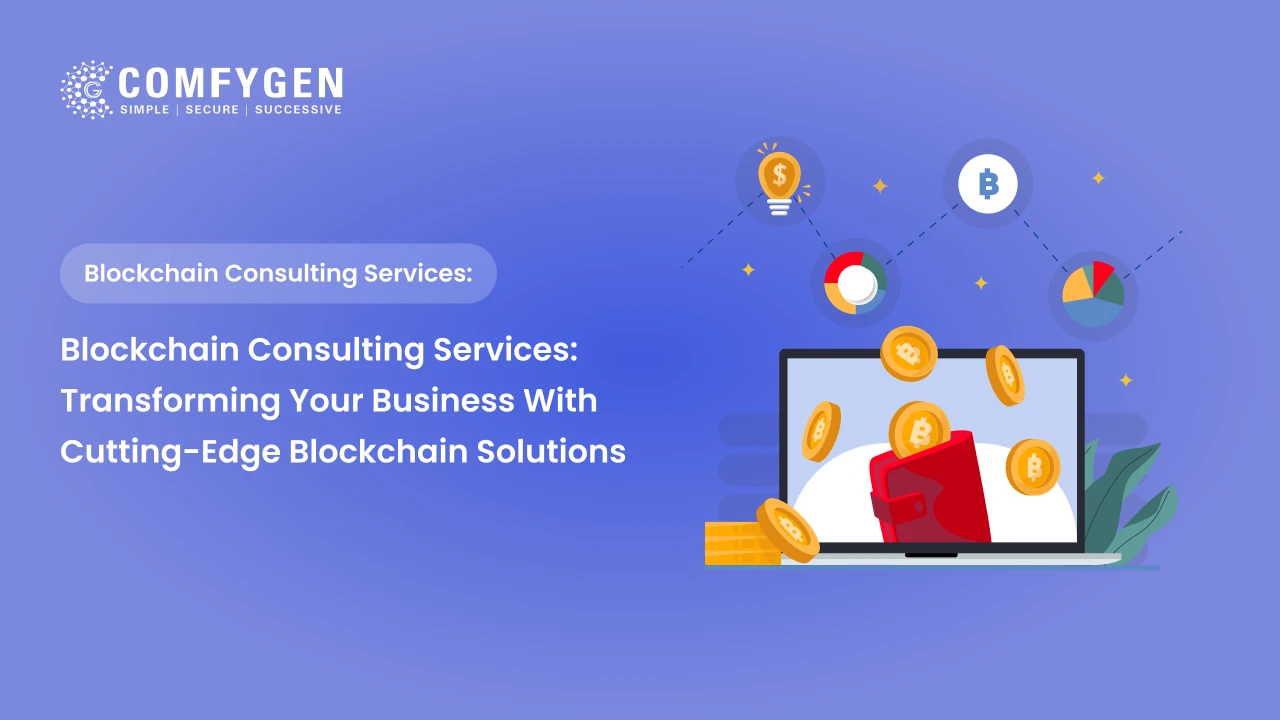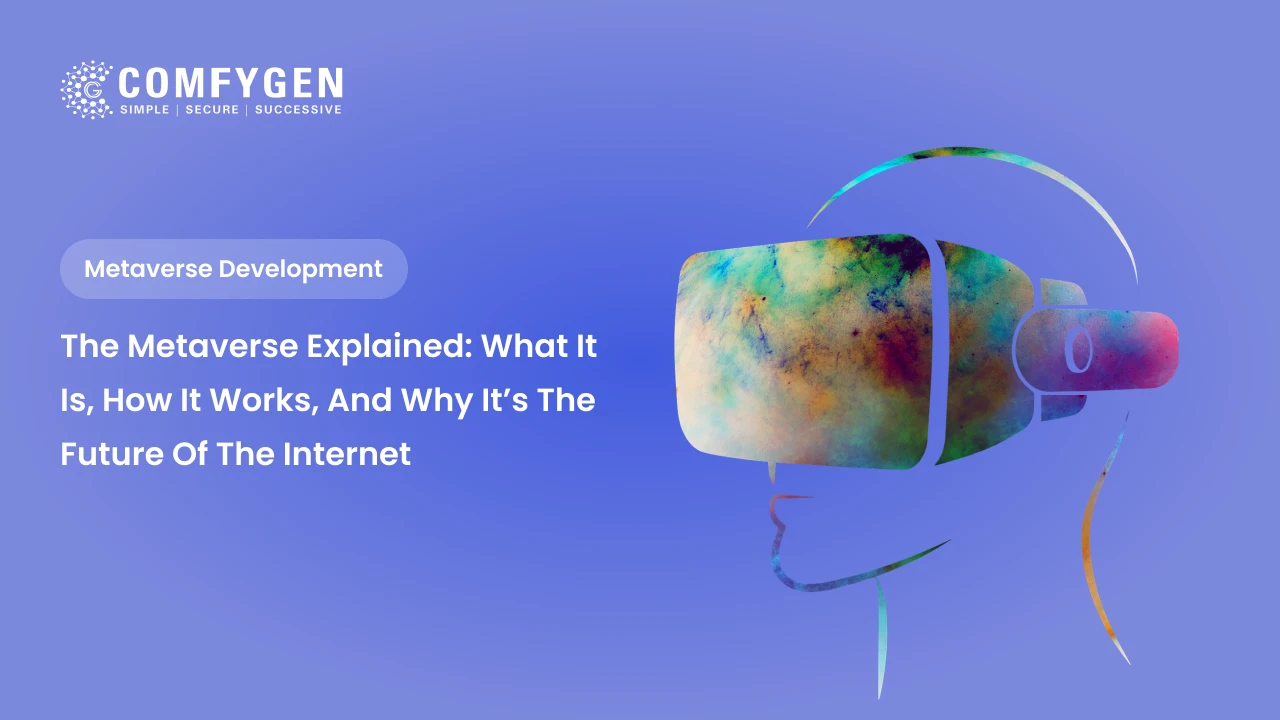How Blockchain is Revolutionizing Industries Beyond Crypto?
Blockchain technology has evolved far beyond its roots in cryptocurrency in the past few years. Once the technology was known for being the backbone of Bitcoin, it has become revolutionary, transforming industries and refining business operational efficiency.
Based on the report by Deloitte, over 80% of companies say ‘Blockchain is scalable and has achieved mainstream adoption.
Be it finance, manufacturing, logistics, or healthcare, blockchain has left its footprint everywhere, driving transparency, efficiency, and security in ways never imagined before.
With the adoption of digital transformation in modern enterprises, blockchain is no longer an option but a strategic necessity. It eliminates intermediaries, automates workflows, reduces fraud, and provides tamper-proof data, building a new era of trust and innovation across the globe.
In this blog, we’ll explore ‘how blockchain is revolutionizing industries beyond cryptocurrency?’ Also breaks down beneath its real-world applications, business benefits, and future trends shaping next-wave enterprise innovation.
What is Blockchain Technology?
Blockchain is a digital ledger technology (DLT) that records information in a secure, tamper-proof, and transparent manner. It operates through a decentralized network of computers (or nodes) where data is stored in blocks and linked chronologically, which forms a chain.
Once data is stored in the blockchain, it cannot be altered or deleted—it is ‘Immutable’. An ideal solution is maintaining the records, verifying ownership, and building the digital reliability.
Key Characteristics of Blockchain:
-
Decentralization: No central authority. Every member in the network/system has access to similar data, increased transparency, and control.
-
Immutability: The immutable feature enables every transaction to be securely recorded in the system without accessibility to alteration or deletion, preventing data manipulation, fraud, and unauthorized access.
-
Transparency: Every transaction is recorded and visible to all network participants, which creates a system of trust with no need for intermediaries.
-
Security: It is powered by advanced cryptography, where blockchain makes data breaches and tampering challenging.
Ready to Leverage
Blockchain for Your Business?
Contact Now
Is Blockchain Only for Crypto?
It’s a ‘No’!
While blockchain was renowned for its technology behind Bitcoin and other Cryptocurrencies. Meanwhile, its potential goes far beyond the digital coins. Cryptocurrency was the first breakthrough, but proof shows how powerful decentralized & tamper-proof systems can be.
Here, blockchain was used to solve real-world problems across industries without a connection to crypto tokens.
Breaking the Myth:
Many still associate blockchain exclusively with buying, selling, or mining crypto. But in reality, it’s being used for:
-
Verifying supply chain authenticity (like tracking a product from factory to shelf),
-
Storing and securing medical records,
-
Enabling smart contracts that auto-execute deals without needing lawyers or middlemen,
-
Protecting digital identities and streamlining KYC processes.
Real-World View:
Government initiatives include testing blockchain for land registrars, voting systems, and digital IDs. Enterprises are trialing for fraud prevention, tracking logistics, and intelligent automated systems. And they do this without trading any crypto at all.
So, no, blockchain is not just cryptocurrencies. It is a foundational technology that is silently transforming innovation across industries and constructing a new digital future — one block at a time.
Real-World Applications of Blockchain
Blockchain has moved on from being a buzzword and has matured into a viable solution that is successfully being utilized to resolve real, expensive, and complex issues in many industries. From increasing traceability in supply chains to reducing overlap in healthcare data management, its practical implementations are changing the way organizations work.
So, on to the exciting part! Here’s a rundown of some of the most significant real-world applications of blockchain technology:
Logistics Transparency
Blockchain allows businesses to track the full journey of goods from origin to delivery, with transparency throughout each step on an unchangeable ledger, allowing for counterfeiting prevention, improved recalls, and heightened trust with customers.
Example: Walmart traces food products back to their source in seconds, not days, with blockchain.
Secure Healthcare Data
Patient data, health records, and prescriptions can be safely stored and only accessed by authorized users, lessening the risk of error, improving efficiency within healthcare, and protecting privacy.
Example: Estonia is using blockchain to store millions of patient records seamlessly to access through their national health system.
Digital Identity & E-government
From managing identities, the blockchain provides a tamper-proof solution to carry out identity management, changing voting, storing public records, and accessing citizen services.
Example: Examples of trust in public digital infrastructures include India’s UIDAI project and blockchain-backed e-voting trials.
Smart Contracts
A smart contract is a self-executing contract that has its terms of agreement directly written into lines of code. They eliminate intermediaries and save time and money while enforcing compliance instantly.
Example: Ethereum powers the DeFi (decentralized finance) movement with loans, trading, and insurance with smart contracts formed from the blockchain.
Financial Services
Trust in Finance Banks and fintech firms have opportunities to use secure blockchain to conduct cross-border, real-time payments, fraud detection through algorithms, and trade settlements.
Example: Ripple and JPMorgan use blockchain for faster international transactions.
NFTs and Content Ownership
Artists, musicians, and creators use blockchain to prove ownership and earn royalties through Non-Fungible Tokens (NFTs), disrupting traditional media platforms.
Example: Platforms like OpenSea and Rarible are enabling direct creator-to-fan relationships.
Benefits of Blockchain for Businesses, SMEs, and Enterprises
Blockchain offers businesses of all sizes operational benefits beyond technology hype. As a startup founder, SME owner, or employee of a large business, it affects your bottom line by improving efficiency, enabling trust, and increasing profit, which will help you build smarter, faster, and safer organizations.
Here’s how blockchain delivers legitimate value to all businesses:
1. Increased Trust and Transparency
All transactions on the blockchain are known and immutable by the authorized parties, meaning all parties have a single source of truth and access.
-
For SMEs: Establishes trust with their customers and partners without trust enforced by an intermediary; thus, third parties do not need to validate trust or transaction.
-
For Enterprises: Furthering regulatory compliance and suitability for enhancing internal accountability.
2. Automation of Business Processes using Smart Contracts
Smart contracts can automate business processes such as payment procedures, approval protocols, and can trigger service delivery timelines to occur, therefore limiting timing delays and human error
-
For SMEs: Reducing operational costs and the need for manual processes.
-
For Enterprises: Business process workflows can support large-scale and consistent processes faster than humans can.
3. Reduction in Operational Costs and Efficiency
Blockchain eliminates the need for intermediaries in processes, which reduces document work and risk of fraud, and will significantly increase legal and administrative costs.
-
For SMEs: Avoidance of high transaction fees and long processing times associated with procedures like cross-border payments or even with the supply chain.
-
For Enterprises: Increased productivity and leveraged resources for departments like supply chain and accounting systems, instead of administrative efforts.
4. Security of Data and Prevention of Fraud
Blockchain inherently protects sensitive data because of its ability to decentralize, cryptography, and, whenever possible, include transparency.
-
For SMEs: Protecting intellectual property, contracts, and data when they are performing business records.
-
For Enterprises: Simultaneously protects multiple-party complex transaction types, or any proprietary data.
5. Access to the Global Market for Innovation
Access to blockchain allows them to create new business models, including tokenized assets, decentralized apps (dApps), and the ability to operate globally.
-
For SMEs: Enables new revenue streams and opens access to global clients.
-
For Enterprises: Power innovation in fintech, logistics, healthcare, real estate, and more.
Use-Cases of Blockchain Across Industries
Blockchain isn’t limited to any one sector — it’s a universal enabler that’s redefining operations, security, and trust across industries. Here’s how different sectors are leveraging blockchain to drive innovation, solve pain points, and future-proof their processes:
Healthcare Problem
Problem: Fragmented medical records, compromised data privacy, prescription fraud.
Blockchain Solution: Unified access to patient data, permissioned access for healthcare providers, and immutable prescriptions.
Example: Medicalchain & Guardtime are building blockchain-based electronic health record (EHR) systems.
Supply Chain & Logistics Problem
Problem: Lack of traceability, counterfeit products, and delays.
Blockchain Solution: End-to-end tracking of products, tamper-proof verification of products, and automated customs clearance.
Example: IBM Food Trust and Maersk’s TradeLens provide increased transparency and optimization in supply chain processes.
Banking & Finance Problem
Problem: Delayed settlement, fraud, compliance overheads.
Blockchain Solution: Real-time cross-border payments, smart contracts for automatic payment settlements (zero friction), and decentralized finance (DeFi) platforms.
Example: Blockchain technology aims to reshape global finance as seen with JPMorgan’s Onyx & RippleNet.
Retail & E-commerce
Problem: Counterfeit products, limited transparency with suppliers, and payment fraud.
Blockchain Solution: Verification of product origin, digital warranties, and payment using cryptocurrency or smart contracts.
Example: Retailers like Walmart and Alibaba are using blockchain to verify the authenticity of their products and to streamline their supply chains.
Government & Public Services
Problem: Corruption, record tampering, diminished transparency.
Blockchain Solution: Transparent land records, secure e-voting, and digital identity verification.
Example: Estonia’s national ID and healthcare systems use blockchain technology.
Education
Problem: Fake certificates, slow verification processes.
Blockchain Solution: Permanently verifiable academic records.
Example: MIT issues blockchain-based diplomas to prevent fraud and simplify verification.
Real Estate
Problem: Manual paperwork, title fraud, lack of ownership trust.
Blockchain Solution: Digital property records, smart contracts for leasing/selling, transparent transaction logs.
Example: Propy is using blockchain for end-to-end real estate transactions.
Future Trends of Blockchain in 2025 and Beyond
As blockchain continues to mature, its role is expanding from being just a disruptive technology to a fundamental pillar of the digital economy. The years ahead promise not just adoption, but integration, evolution, and transformation.
Here are the top trends shaping the future of blockchain in 2025 and beyond:
-
Blockchain + AI = Smarter Automation
The fusion of Artificial Intelligence and blockchain is set to drive smarter, self-learning systems. From predictive analytics in supply chains to intelligent contract automation, AI will make blockchain more powerful and responsive.
Imagine smart contracts that can analyze risks or market data before execution.
Rise of Web3 & Decentralized Applications (dApps)
Web3 is redefining internet ownership and interaction. Blockchain enables decentralized apps where users have control over their data, identity, and assets.
Platforms like Ethereum, Polkadot, and Solana are leading this next-gen web revolution.
Digital Identity & Privacy Enhancement
With rising concerns over data misuse, blockchain-based digital identities will give users full control over their personal information, minimizing the risk of breaches.
Expect secure ID wallets for everything — from banking to online access and even voting.
Enterprise Blockchain Adoption at Scale
More organizations will shift from pilot projects to full-scale blockchain integrations in areas like HR, legal, procurement, and cybersecurity, aiming for transparency, automation, and cost reduction.
Think of blockchain as the new backbone for enterprise infrastructure.
Green & Sustainable Blockchain Networks
With growing environmental concerns, the focus will shift to energy-efficient blockchain protocols (like Proof of Stake). Sustainability will become a key differentiator.
Ethereum’s move to PoS is already cutting energy use by over 99%.
Central Bank Digital Currencies (CBDCs) & Regulation
Governments across the globe are launching CBDCs powered by blockchain to modernize monetary systems. Alongside this, regulatory frameworks will evolve to support innovation without compromising safety.
China, India, and Europe are already testing or rolling out digital currencies.
Stay ahead with
future-ready technology
Contact Now
Why Comfygen is Your Ideal Blockchain Development Partner
When it comes to turning blockchain ideas into scalable, real-world solutions, Comfygen stands out as a trusted and experienced development company. With a proven track record in building powerful, secure, and customized blockchain applications, Comfygen empowers both SMEs and large enterprises to harness the full potential of decentralized technology. From smart contract development to blockchain consulting and full-stack dApp creation, our team delivers end-to-end solutions tailored to your business goals. If you’re ready to innovate, streamline operations, and gain a competitive edge with blockchain, Comfygen is your go-to technology partner for reliable, future-ready development.
Final Thoughts
Blockchain is no longer just the engine behind cryptocurrency — it’s a transformational force that’s redefining how industries operate, how businesses build trust, and how digital systems are structured.
From supply chains and healthcare to finance, real estate, and public governance, blockchain is making processes more secure, transparent, and efficient. And it’s not just for tech giants — SMEs and startups are equally poised to benefit from this shift by embracing smarter, decentralized solutions that reduce costs and build credibility.
As we move deeper into the Web3 era, the businesses that adopt blockchain early will have a clear competitive edge — one that’s rooted in trust, automation, and innovation.
Whether you’re building the next disruptive startup or optimizing an enterprise operation, blockchain isn’t just an option anymore — it’s the future of business.
Frequently Asked Questions (FAQs)
What is blockchain technology?
Blockchain is a digital ledger technology (DLT) that securely records transactions in a decentralized, tamper-proof manner. Data is stored in blocks and linked chronologically, creating an immutable chain. It operates through a network of computers (nodes) that provide transparency, security, and trust.
Is blockchain only used for cryptocurrency?
No, blockchain has applications far beyond cryptocurrency. While it was initially associated with Bitcoin and other cryptocurrencies, it is now used in various industries like finance, healthcare, supply chain, and more. Blockchain helps solve real-world problems like supply chain traceability, data security, and automated contracts without involving crypto tokens.
How does blockchain improve business operations?
Blockchain improves business operations by:
-
Increasing transparency: All transactions are visible and immutable, creating trust between parties.
-
Enhancing security: Data is encrypted and can’t be altered, reducing fraud and data breaches.
-
Automating processes: Smart contracts can automate workflows, reducing manual intervention and errors.
-
Reducing costs: Blockchain eliminates intermediaries, lowering operational costs.
What industries can benefit from blockchain technology?
Blockchain is transforming a wide range of industries, including:
-
Supply Chain & Logistics: Enables transparent tracking of goods and products.
-
Healthcare: Secures patient data and improves access to medical records.
-
Finance & Banking: Facilitates secure, real-time transactions and cross-border payments.
-
Government & Public Services: Used in land registries, voting systems, and digital identities.
-
Real Estate: Simplifies property transactions and prevents fraud.
What are smart contracts?
Smart contracts are self-executing contracts where the terms of the agreement are directly written into code. They automatically execute actions (e.g., payments or service delivery) once predefined conditions are met, eliminating the need for intermediaries like lawyers or notaries.
How can blockchain benefit small and medium-sized businesses (SMEs)?
Blockchain offers SMEs numerous benefits, such as:
-
Improved trust and transparency with customers and partners.
-
Reduced operational costs by automating processes with smart contracts.
-
Enhanced security for sensitive business data and transactions.
-
Access to global markets, enabling new revenue streams and business models.
What is Web3, and how does it relate to blockchain?
Web3 is the next evolution of the internet, where decentralized applications (dApps) give users control over their data, assets, and digital identities. Blockchain technology underpins Web3, offering secure, transparent, and decentralized frameworks for digital interactions.

Mr. Saddam Husen, (CTO)
Mr. Saddam Husen, CTO at Comfygen, is a renowned Blockchain expert and IT consultant with extensive experience in blockchain development, crypto wallets, DeFi, ICOs, and smart contracts. Passionate about digital transformation, he helps businesses harness blockchain technology’s potential, driving innovation and enhancing IT infrastructure for global success.
Based on Interest

Blockchain Consulting Services: Transforming Your Business with Cutting-Edge Blockchain Solutions
Introduction Blockchain technology is revolutionizing industries by providing secure, decentralized, and transparent solutions. As businesses across the world explore their potential,…








